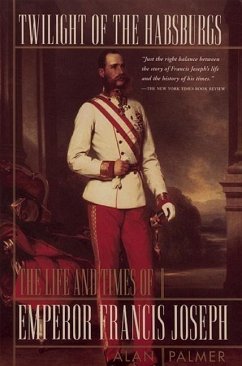No ruler in modern times reigned in full sovereignty for as long as Francis Joseph emperor of Austria and king of Hungary, Bohemia, Dalmatia, Croatia, and Slavonia. Titular master of central Europe from 1848 until 1916, he was center stage in Europe throughout the dramatic era in which Italy and Germany emerged as united nation states. His personal decisions were vital both to the outcome of the Crimean War and to the onset of World War l, sixty years later. Although he was an autocrat who believed ill the Habsburg dynastic mission to provide eleven distinct nationalities with a cohesive unity, he was also a family man of simple tastes; and in his old age he was revered in his Austrian heartland, much as Queen Victoria was within her empire. Francis Joseph suffered a succession of personal disasters: his brother, Maximilian, was executed by Mexican republicans; his only son, Rudolf, shot himself and his mistress at Mayerling; his empress-queen Elizabeth, died from stab wounds in Geneva; his nephew and heir, Francis Ferdinand, was assassinated at Sarajevo. These episodes are examined anew by Alan Palmer in a biography of revelation, reassessment, and restoration. Too often the emperor is represented as a lonely, humorless bureaucrat, lacking in human warmth, artistic sensitivity, or political perception. Alan Palmer believes that this is a false impression. From a reading of hundreds of the emperor's letters, as well as his mother's diaries and other papers in the Vienna archives, Alan Palmer presents a more rounded and sympathetic portrait of Francis Joseph as the head of an empire and the head of a family. He has also used Elizabeth's curious verse journal, only recently made public, and the extensive writings of the controversial Crown Prince Rudolf in a reappraisal of the conflicting emotions that troubled the oldest of dynasties at a time of immense social, cultural, and political change for European society. Finally, Alan Palmer examines the durability of the Francis Joseph legend and its manifestation in republican Austria today.
Hinweis: Dieser Artikel kann nur an eine deutsche Lieferadresse ausgeliefert werden.
Hinweis: Dieser Artikel kann nur an eine deutsche Lieferadresse ausgeliefert werden.







